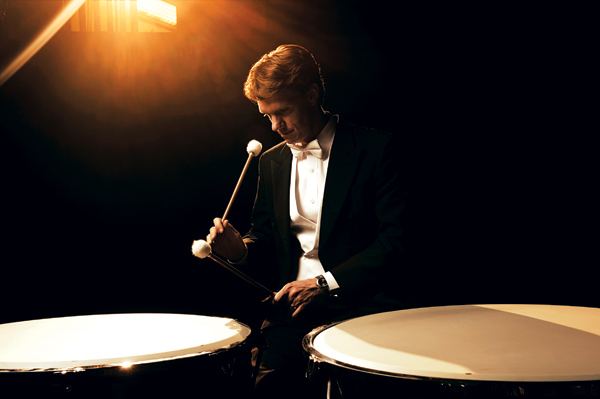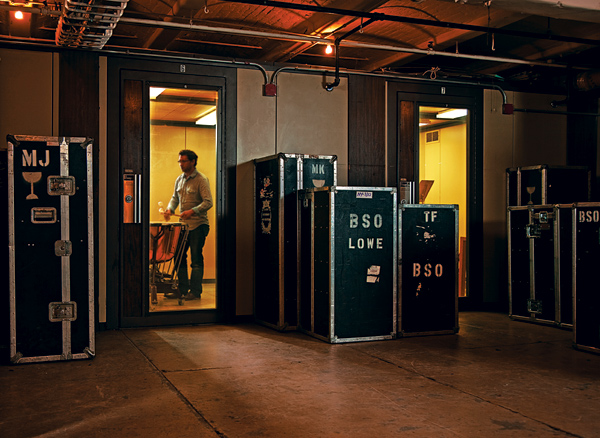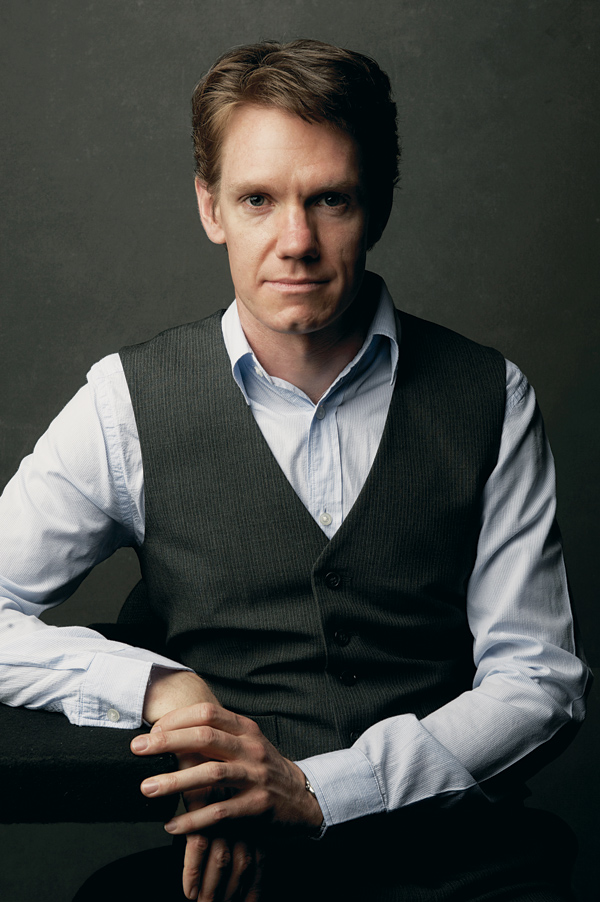Mike Tetreault’s BSO Audition

Photo by Sean Hagwell
Mike Tetreault has spent an entire year preparing obsessively for this moment. He’s put in 20-hour workdays, practiced endlessly, and shut down his personal life. Now the percussionist has 10 minutes to impress a Boston Symphony Orchestra selection committee. A single mistake and it’s over. A flawless performance and he could join one of the world’s most renowned orchestras, the Boston Symphony Orchestra.
It’s close to 5 o’clock on a late afternoon in January when Mike Tetreault, a tall, lanky redhead, turns off Massachusetts Avenue and enters Symphony Hall through a side door. He checks in with the security guard and then heads for the basement, wrestling with more than 150 pounds of gear (mallets, snare drums, tambourines) in a backpack and a roller bag. The rest of the instruments he’ll need tonight will be supplied by the Boston Symphony Orchestra. He’s an hour and a half early.
The basement of Symphony Hall is nothing like the velvety opulence upstairs. It’s cold down here, with concrete walls and harsh fluorescent lights. As Tetreault signs in at a table and waits to get into a practice room, he notices the oversize instrument travel cases that are strewn everywhere, ready to safeguard harps and timpani during symphony tours. Tetreault, a Colorado-based percussionist, has already survived a nerve-wracking round of cuts to get this opportunity tonight to audition for one of two openings at the world-renowned BSO. He reads the list of the other contenders and is pleased to see a bunch of names he doesn’t know. Younger, he reassures himself. Less experienced. Hopefully that’s an advantage for him.
Tetreault has been working and practicing for this audition ever since Facebook, the online message boards, and the trade magazines began buzzing a year ago about two BSO spots opening up at the same time, one because of a retirement and one because a percussionist had been denied tenure, a polite way of saying he’d been shown the door. Tetreault knew all about this second opening, because the guy who’d gotten the ax was actually his former schoolmate. Now, in his friend’s misfortune, he saw the opportunity he’d been working for his entire career.
At 33, Tetreault was putting in 100-hour weeks on a patchwork of gigs he’d pieced together — simultaneously serving as the music director at the Galilee Baptist Church in Denver; teaching at the University of Colorado; and working various gigs with the Boulder Philharmonic, the Fort Collins Symphony, the Colorado Ballet, the Colorado Symphony, and Opera Colorado. Yes, he was doing what he loved for a living, but when he added it all up, it was barely a living at all. He’d made $55,000 the previous year, pretty good — until you factored in all the hours, and the fact that the salary had to support two since his wife, Rachel, had been laid off in 2010 from a communications job with the Colorado Symphony. The couple was living in a 625-square-foot one-bedroom apartment.
Waiting for his practice room in Symphony Hall, Tetreault reminds himself that if he can win a spot with the BSO, his very existence will be transformed. He’s aware of the challenges — the selection process is brutal, and even if he lands a job, there’s no guarantee he’ll keep it (as his former schoolmate learned). But the orchestra is a godsend for the very few who make it. The positions pay more than $100,000 a year. You get health benefits. You get vacation. You get to lead a normal life. Which is why the BSO is one of the handful of orchestras for which musicians the world over will drop everything to scramble for a job. Like Tetreault, they’ll practice endlessly for months, sacrificing family and personal time. They have to.
The classical audition ranks among the world’s toughest job interviews. Each applicant has 10 minutes at most to play in a way so memorable that he stands out among a lineup of other world-class musicians. Tetreault has prestigious degrees from the University of Rochester’s Eastman School of Music and the Royal Academy of Music in London, and he’s studied under the world-renowned performer Christopher Lamb, but at his audition, the only thing that will matter is how he performs in the most pressure-packed few minutes of his life. If he squeezes his glockenspiel mallet too hard, choking the sound, or if he overthinks the dotted rhythm or fails to adjust to the BSO’s oddly scaled xylophone bars and misses a few notes, the whole thing will be over. Mark Volpe, managing director of the Boston Symphony, sums up the audition process this way: “I want someone to be so brilliant that there’s no question.”
At last, a practice space opens up for Tetreault. Percussionists warm up on a glockenspiel for 10 minutes in one practice room, then move to the next for the xylophone. As they get ready, the auditioners are battling their nerves. The calmest eat bananas, which are supposedly full of natural beta blockers. Some are buried in headphones. One viola player swears a secret weapon helped him win a place in a prestigious orchestra — masturbating immediately before his performance.
When Tetreault’s turn to audition finally arrives, a proctor appears and leads him upstairs to the stage, where the lights are hot and bright. The first thing he notices is that the floor slopes slightly forward. The second thing he notices is the sound he hears. There’s a lot of rustling — the jury is restless. But he can’t see anyone. A screen is separating him from the audition committee, concealing his identity to ensure impartial judging. This anonymity has helped women and minorities break into the field, but now, up on stage, Tetreault finds it disconcerting. The proctor announces his assigned number and Tetreault quickly studies the mallet instruments he’ll be playing. Though the symphony has previously sent an e-mail telling him the width of the bars, he doesn’t know how they’ll react when he strikes them.

Pressure cooker: Generations of musicians have warmed up for BSO auditions in Symphony Hall’s tiny basement practice rooms. (Photo by Matt Kalinowski)
Boston, New York, Philadelphia, Cleveland, and Chicago are the country’s five most historically important symphony orchestras, but even among them, the BSO stands alone. With a budget of roughly $80 million, and a staggering $387 million endowment (about twice New York’s), the BSO might be America’s most financially stable orchestra.
The BSO was founded in 1881, and, of course, owns Symphony Hall, one of the world’s finest acoustic spaces. No matter how softly the 94-member orchestra plays or how far back you’re sitting, the sound blooms warm and clear. There’s the BSO’s Tanglewood Music Center, which has taught 30 percent of the musicians who currently play in the bigger American orchestras. Its Boston Pops, meanwhile, has not only a national audience, but also a number of lucrative national sponsorships. In sum, the BSO is a destination orchestra even for musicians already working in the Big Five. This year alone, a violist left the Philadelphia Orchestra and a bass trombonist departed the New York Philharmonic to take jobs in Boston.
And for percussionists like Tetreault, the BSO is the home of legends. Those classic drumsticks that students get for their first lesson are stamped with the name of Vic Firth — Boston’s timpanist for 50 years. The white-felted mallets perched atop the bass drum in every band room in America bear the name of Tom Gauger, the BSO’s bass drum player for 45 years. Those crisp castanets that run $140 and can cut through an entire opera orchestra to accompany the sultry Carmen? They’re Frank Epstein’s. He played with Boston for 43 years.
Mike Tetreault found out about the BSO openings in early 2011. From that point forward, he prepared for his audition obsessively. During one 10-day stretch, he practiced 20 hours a day. Because he and his wife, Rachel, didn’t want to waste the precious few minutes they got to see each other during the week, they arranged regular meetings to deal with everyday concerns like finances and schedules.
Tetreault couldn’t rehearse in his tiny apartment, so he took over the Baptist church where he worked, splitting up his collection of instruments — glockenspiel, xylophone, marimba, three differently sized snare drums, four pairs of crash cymbals, a bass drum, eight tambourines, four tom-toms, four timpani, and three triangles — among the chapel, the choir room, and a smaller classroom. Each space had different ceiling heights, enabling him to hear his sound in different ways.

“Give me success or take this desire away from me. One of the two.” — Mike Tetreault, Percussionist (Photo by Sean Hagwell)
The physical demands of preparing for the audition were intense, and Tetreault ate like an athlete: protein drinks with kale, lots of brown rice and vegetables, no caffeine despite rarely getting enough sleep. Then there were the hand stretches he’d do before picking up a stick in the morning and going to bed at night.
Throughout that year, almost every night was the same for Tetreault: After a full day of work that also included a practice session or two, he’d arrive at the church and turn off his phone (thereby frustrating Rachel, who couldn’t get in touch with him). Then he’d begin his practice, watched constantly by two people — the church’s first-ever pastor and the pastor’s wife, whose portraits hung side by side on a wall in the chapel. When things went well, Tetreault felt he could see the pastor smiling. When he missed a note, he found himself sneaking looks at the wife and her furrowed brow.
At 7 p.m., he’d carry his 5-inch-deep snare drum into the church’s classroom. There, he’d pick up a pair of hickory drumsticks and tap softly on the drum head, making the bottom snares buzz. Sometimes his right wrist would flick slightly harder than the left, producing a sound not unlike a woman limping in high heels. Tetreault concentrated harder, straining to catch and then eliminate these imperfections from his playing. When an accent popped too much, cracking and towering over the other notes, he’d release the weight of the stick as though dribbling a basketball. And just in case he was missing something, he’d record his practices, listening to each of them three times to make sure he was slicing the beats into precise halves, quarters, and sixteenths — slicing like a surgeon rather than a butcher.
During rest periods he’d continue practicing in his mind — singing excerpts and visualizing his hands executing a perfect xylophone lick. In the quiet moments, he discovered an unwanted accompaniment — the buzzing of fluorescent lights. Concert B-flat, he thought to himself.
At 9 p.m., he’d change drums and change rooms, going for a higher ceiling to let his tones expand, more like how the stage sounds, echoes and all. He’d switch off the snares, turning the drum into a hollow tom-tom, and use thicker sticks to balance the drum’s hollow ring with a groovy, swinging sound.
At the end of each night, he’d record a batch of excerpts that he’d eventually send to Christopher Lamb, his teacher and the principal percussionist of the New York Philharmonic. Lamb would then follow up with e-mailed notes, such as — in the case of Ravel’s Boléro, a piece with a famously repetitive snare-drum part — “You’re too young, this is too fast for this old guy … relax, be more inviting.”
At midnight, Tetreault would arrive back at home. Rachel would be sound asleep, and he’d sink into bed beside her. A few hours later he’d rise and begin the day with a 3-mile run. And the whole cycle would start again.
One reason there were two openings rather than just one at the BSO was the retirement of percussionist Frank Epstein, who joined the orchestra in 1968 at the age of 26, which was then considered extremely young. Most members back then had at least five years’ experience with an orchestra before making it to Boston.
After more than four decades with the BSO, retirement crept up on Epstein. He’d begun thinking about it in 2010, but it wasn’t until 2011 that he finally got tired of fighting the pain he felt while performing — it moved through his feet and knees, up to his wrists and shoulders. His last two concerts that year looked perfectly programmed for a percussionist’s farewell — one, Beethoven’s Ninth Symphony at Tanglewood, the other, Berlioz’s Requiem at Symphony Hall. But the Beethoven concert was canceled because of Hurricane Irene. And then a conductor fell ill and the Berlioz program was changed to an evening of Mozart, meaning Epstein wouldn’t be needed.
Epstein has visited Symphony Hall only once since his 2011 season, and for just one piece, the premiere of John Harbison’s Sixth Symphony. “I haven’t gone to a concert, because I couldn’t bring myself to go back to that,” he says. “I still need the space. I couldn’t stand it if someone picked up the cymbals and didn’t do a good job. It kind of terrifies me.”
Some of that may simply be professional pride, but some of it may reflect his belief that younger musicians are moving the music in new directions. Epstein says the current audition process rewards a different kind of player. There used to be at least a little room for flair while auditioning, he says. Back when he went before the judges, he got creative and performed a piece he’d composed for bass drum and cymbals.
These days, he says, “The technique on the instruments has grown, but what hasn’t grown is the innate musicianship, the interpretive abilities of players. Sometimes that is the most difficult thing to measure in an audition.”
And the audition process isn’t the final time a musician finds himself judged. A player who wins an audition is put on a one-year probation period. At the end of that year, the committee that hired him reconvenes to evaluate his performance and vote on whether to award tenure. From September 1980 to March 2010, the BSO held 119 auditions, and more than 90 percent of the musicians hired from them wound up receiving tenure.
“No one wants to go through a probation trial period and not give the guy tenure,” Volpe, the BSO’s managing director, says. “You want to avoid that. That’s why the audition is almost sacred — it’s almost a sacred ritual.”